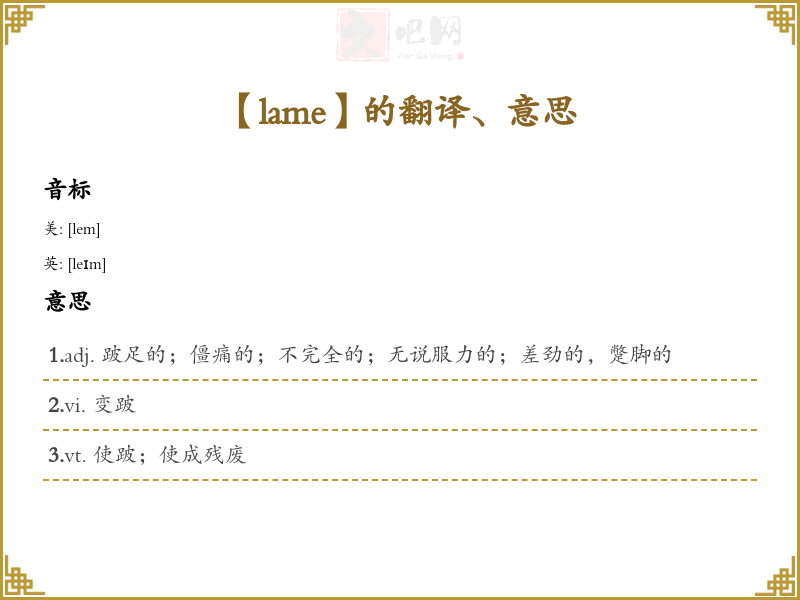【lame】的翻译、意思
时间: 2025-01-11 02:40:29
【lame】怎么读
美:[lem]
英:[leɪm]
【lame】是什么意思、字义解释
1. adj. 跛足的;僵痛的;不完全的;无说服力的;差劲的,蹩脚的
2. vi. 变跛
3. vt. 使跛;使成残废
【lame】等级考试
TEM4 ( lamer, lamest )
【lame】的详细解释
英文单词学*与分析:[lame]
1. 基本定义:
-
字面意思:
"Lame" 的字面含义是指由于受伤或疾病而无法正常行走的状态。
定义:形容一个人或动物在行动上受限,通常因为腿部的伤害。此外,它也可以用来形容某事物缺乏说服力或令人失望。 -
词性:
形容词(adjective),例如:a lame excuse(一个无力的借口)。
2. 词源与起源:
-
词源分析:
"Lame" 源自于古英语 "lame" 或 "lama",其词根可以追溯到印欧语系的 *lāmā,意指“无力的”或“瘫痪的”。 -
历史背景:
该词在英语中的首次使用可以追溯到公元前12世纪,常常用于描述因伤残而行走困难的人或动物。 -
课本:
在*的英语教材中,"lame" 可能出现在初中和高中阶段的词汇练中。
在牛津和美国的教材中,"lame" 可能出现在初学者的词汇表中,尤其是在描述身体状况和表达意见时。
3. 使用场景:
-
正式与非正式语境:
- 正式场合:在医学或法律文献中描述伤残情况。
- 非正式场合:在日常对话中,用于形容无趣或不可接受的事物。
引证解释:
"His excuse for being late was so lame that no one believed him."(他迟到的借口实在无力,以至于没人相信他。) -
特殊场合:
- 在法律领域,"lame" 可能被用来描述由于事故导致的伤残。
- 在艺术领域,"lame" 可用于描述某些作品缺乏创意或吸引力的特质。
4. 示例句子:
-
The dog was lame after the accident.
这只狗在事故后变得跛了。 -
That was a lame joke; nobody laughed.
那是个无聊的笑话,没人笑。 -
She gave a lame excuse for not attending the meeting.
她给了一个无力的借口,没去参加会议。 -
The film was criticized for its lame plot.
这部电影因其无趣的情节受到批评。 -
After the injury, he felt lame both physically and emotionally.
受伤后,他在身体和情感上都感到疲惫。
5. 同义词与反义词:
-
同义词:
- "Injured"(受伤的):强调身体的伤害。
- "Weak"(虚弱的):更一般的形容词,指身体或意志的力量不足。
-
反义词:
- "Able"(能够的):表示正常功能或能力。
- "Strong"(强壮的):强调身体的力量和健康。
. 学方法:
谐音联想记忆:
将 "lame" (跛的)联想为 "lame" 读音类似 "雷姆",想象一个名叫雷姆的角色因受伤而走路困难。通过这种方式,可以帮助记忆单词的含义。
7. 关联词汇:
- lame excuse(无力的借口)
- lame joke(无趣的笑话)
- lame duck(无能的角色)
- lame animal(受伤的动物)
通过以上内容的学*,可以更全面、深入地理解和应用 "lame" 这个单词。
【lame】例句
1、[ADJ] If someone is lame, they are unable to walk properly because of damage to one or both of their legs. 瘸的
例:He was aware that she was lame in one leg.他知道她有一条腿是瘸的。
2、[N-PLURAL] The lame are people who are lame. 瘸子
例:...the wounded and the lame of the last war.…在上次战争中受伤的和腿瘸的人。
3、[ADJ] If you describe an excuse, argument, or remark as lame, you mean that it is poor or weak. 站不住脚的
例:He mumbled some lame excuse about having gone to sleep.他为刚才睡着咕哝了个站不住脚的理由。
4、[[ADV with v]] lamely 站不住脚地
例:"Lovely house," I said lamely.“好漂亮的房子,”我勉强地说。
